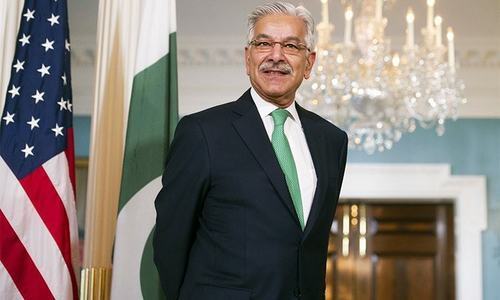WASHINGTON: Prime Minister Shahid Khaqan Abbasi had an unscheduled meeting with US Vice President Michael Pence here on Friday and their talks focused on finding a negotiated settlement to the conflict in Afghanistan, official sources told Dawn.
The sources said the 30-minute, one-on-one meeting took place at the vice president’s residence at the US Naval Observatory, which is close to the Pakistan Embassy in Washington. The meeting was held on Pakistan’s request.
Michael Cutrone, special adviser to Vice President Pence for South Asian Affairs, attended the meeting as a note-taker. No US or Pakistani official accompanied the two leaders at this meeting.
Abbasi tells US lawmakers that Islamabad’s close ties with China should not be a cause of concern for Washington
Later, the prime minister also had a 40-minute meeting with Congressman Ted Yoho, chairman of the House Committee on Asia and the Pacific, and its ranking Democrat, Congressman Brad Sherman.
Like Mr Pence, the US lawmakers also focused on the current situation in Afghanistan but they expressed “their concern about China’s growing influence in Pakistan” as well, sources told Dawn.
While discussing bilateral relations, the two lawmakers conveyed their concern about blasphemy cases against Christians in Pakistan, the sources added.
In the Pence-Abbasi meeting, both sides “explained their perspectives” on Afghanistan. The prime minister assured Mr Pence of Pakistan’s “sincere commitment” to efforts for peace in Afghanistan and also underlined “Pakistan’s successes” in the war against terrorism, the sources said.
“The prime minister assured the US leader that no other state wants peace in Afghanistan more than Pakistan does, as it will be a direct beneficiary of this peace,” said a source.
Diplomatic observers in Washington view the Pence-Abbasi meeting as a continuation of their talks on the sidelines of the UN General Assembly in New York last year.
At that Sept 20 meeting, the two allies had resolved to remain engaged and carry forward the relationship that had been on a downward trajectory since the announcement of the US policy for Afghanistan and South Asia in August 2017.
Official sources in Washington said that the desire to continue the bilateral relationship was expressed at Friday’s meeting. Pakistan felt the need to request another meeting with Mr Pence because the last meeting had “moved things forward,” said one source.
Other sources noted that recent “positive developments” also encouraged Pakistan to seek a meeting. They referred to several statements from both US civil and military officials, acknowledging that Pakistan has taken “some positive steps” for restoring peace to Afghanistan. US officials noted that Pakistan had been encouraging the Taliban to participate in the reconciliation process, as Washington desires.
“Statements from the US side have started to change. Pakistan too is doing what it should have. Channels are more open now than before. There have been regular interactions between the two governments,” said a non-Pakistani diplomatic source when asked to explain why Pakistan felt the need to ask for this meeting.
“It’s difficult not [to] focus on anything…but Afghanistan,” said the non-Pakistani diplomatic source when asked what he thought was the focus of this meeting. “But they must have also talked about bilateral relations and, as Pakistanis say, about making this relationship more multi-faceted.”
But the source added that he was not in a position to say if this meeting could lead to “concrete results”.
“I would say, it was more of a review of progress and expression of good intentions than a substantial discussion on future plan of action,” the source said.
Both Pakistani and congressional sources, however, were more open about the prime minister’s meeting with the lawmakers. According to them, the prime minister assured the lawmakers that “Pakistan’s close relations with China should not be a cause of concern for the US” as Islamabad “wants close friendly ties with both China and the United States.”
Prime Minister Abbasi arrived in Washington on Wednesday to be with his elder sister — not Senator Sadia Abbasi — who underwent a disc-surgery at a Washington hospital.
Published in Dawn, March 17th, 2018













































